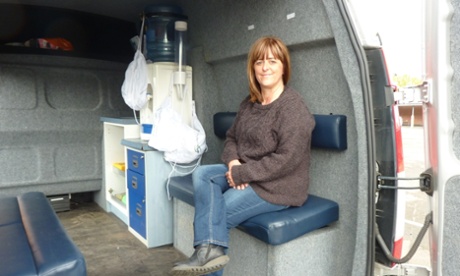
If the weather is good, I start the day with a cuppa in my garden, checking my phone. Anything could have happened overnight and I need to catch up with the vice liaison officer (VLO) before I get into the women’s centre in Swindon by 8:30am.
The centre opened in 2014, and everyone who works there attends our morning meeting. We go through the day’s business, focusing on safeguarding; we are currently working with one woman who carries a knife. Any call from our VLO, Louise Kuklinski, takes priority. She’s brilliant – we work really well together. If she has seen a sex worker in a bad way the night before, I will ring them immediately and offer to pop over. If the sex worker is in a house where there’s known criminal activity, she can jump into my van and I’ll take her back to our centre for toast, marmite and a cup of strong tea. Once she’s relaxed, we can talk. Sometimes these women have been sexually assaulted. This would lead to a meeting with the VLO and then to the sexual assault referral centre. She will then be examined and interviewed and a police investigation begins.
I feel as though my job description was written especially for me! I was a criminal justice drugs worker for 12 years, but my main interest was always supporting street sex workers. I took a £5,000 drop in salary to take up this role in July 2014 just because I believe so passionately in the work. My post is funded by the police and crime commissioner for Wiltshire, Angus McFearson, and I’m hopeful that there will be funding for another year.
This is pioneering work. Before I came along, sex workers in Wiltshire were sent to court and fined. Now, no sex worker goes to court and I’m here to help them. I’m an employee of the Nelson Trust, a charity supporting people affected by addiction and trauma. The majority of these sex workers are on the street to support a Class A drug habit (mainly crack cocaine), so it makes sense that the trust provides community services like this. Night-time outreach is at the heart of our work. Every Thursday, I work through the night with a volunteer. The women feel safe in my van – I have everything they need.
I am in regular contact with 30 sex workers, and maintaining their confidence is key. I’m privy to a lot of confidential information, and only share safeguarding and risk information. I’m probably the only person they trust. It’s a huge responsibility; I find it very distressing when a client hasn’t reported a traumatic event like sexual assault – they just expect it.
I don’t know where I’d be without the expert support of my supervisor, colleagues and the Nelson Trust community. I have to work very hard to ensure that other agencies share information in a timely way. I keep everyone in the loop and our monthly confidential multi-agency meetings are crucial. This is our opportunity to get local police, probation, housing, a safeguarding midwife, social services, a sexual health nurse, drugs worker and a mental health worker around our table to discuss all 43 sex workers in Swindon. These sex workers are real survivors – I can tailor each support plan to the individual. I feel so motivated, mainly because I can work hand-in-glove with the VLO. We are flexible and we really get things done.
If I wasn’t an outreach worker, I’d be looking after rescued dogs. I have two of my own – I absolutely love them. Outside work, I love pottering in the garden. It’s such a haven, despite being in the town centre. I find it so therapeutic to pull up weeds, plant veg and sit and listen to the birds and my wind chimes.
Sometimes I come across people with bad attitudes. Once I was out with friends and was asked “So will you be out whoring tonight?” Some people need educating. Historically, sex workers have been viewed as loose women with no morals, but things have really moved on – they are victims who need support. People often say “Thank God there’s such a role as yours.” By pulling together with all these top professionals, I’m able to make a huge difference to the lives of the sex workers on the streets where I grew up.
If you would like to feature in our Day in the Life series, or know someone who would, email socialcare@theguardian.com.

